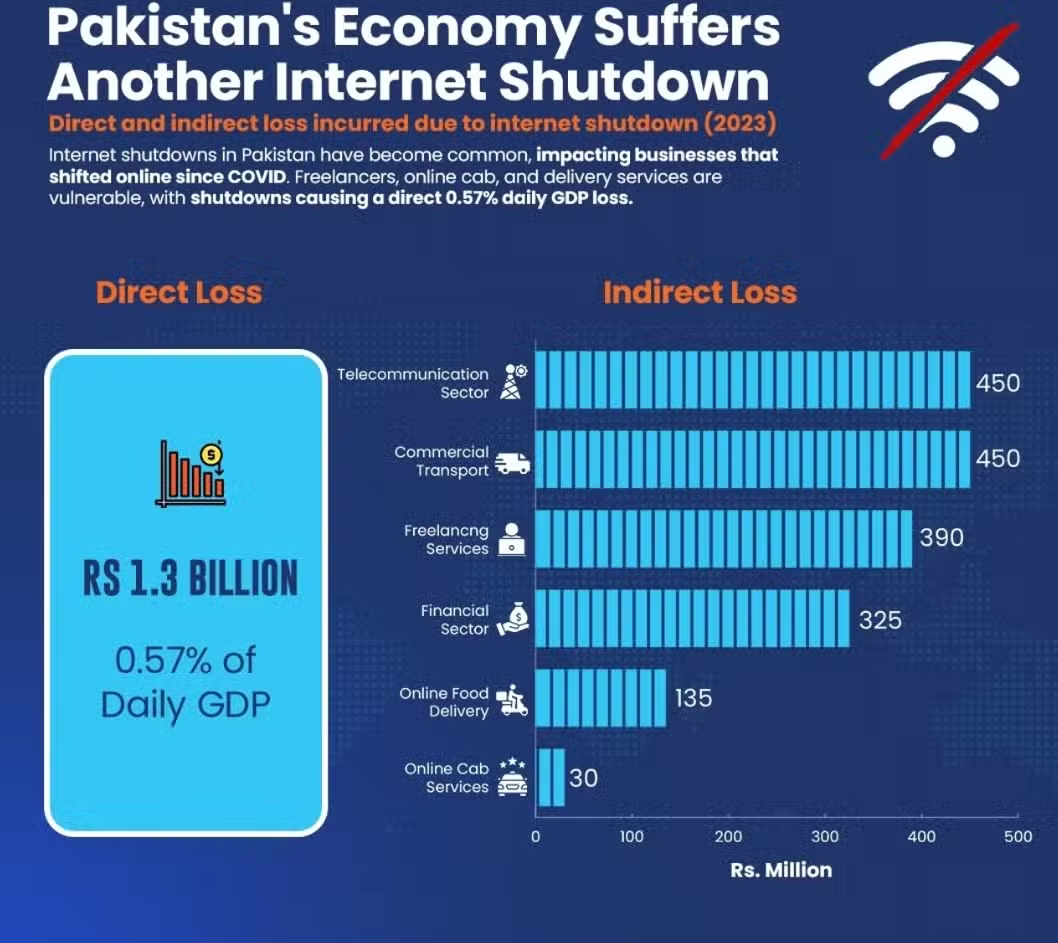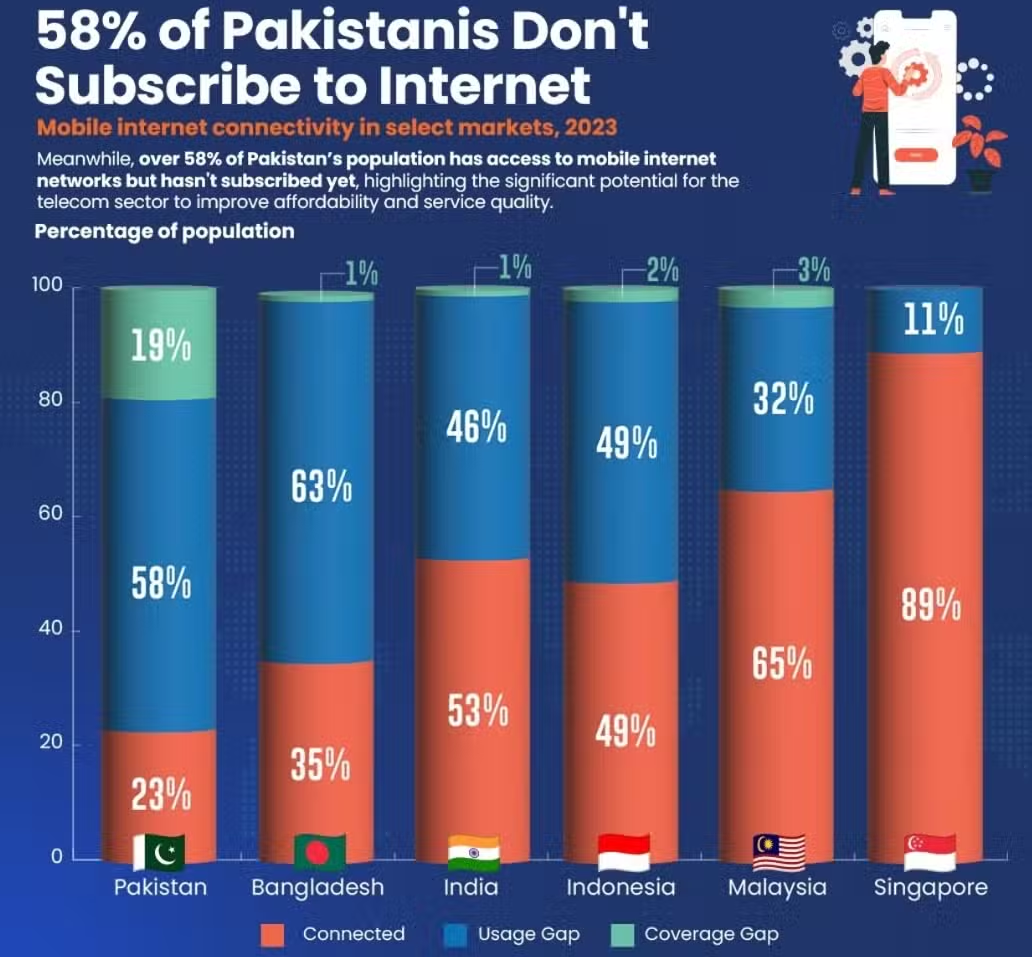Internet Shutdowns in Pakistan Lead to Business Losses Exceeding Rs. 1.3 Billion
In recent years, Pakistan has experienced a troubling trend of internet shutdowns, which have had a profound impact on the country’s economy. These frequent disruptions in connectivity have caused significant losses, especially for businesses that have shifted towards online operations in the wake of the COVID-19 pandemic. According to a recent report from the Overseas Investors Chamber of Commerce and Industry (OICCI), these internet blackouts have directly resulted in a loss of Rs. 1.3 billion. When factoring in indirect costs, the total economic impact soars to an estimated Rs. 1.7 billion.
Pakistan’s economy is highly reliant on internet connectivity for a wide range of industries, including e-commerce, financial services, and freelance work. When the internet goes down, these sectors suffer immediate setbacks, halting operations, preventing transactions, and slowing communication. According to the OICCI report, the internet disruptions have shaved off 0.57% of the country’s Gross Domestic Product (GDP). This loss is particularly alarming given Pakistan’s aspirations to modernize its economy and build a more resilient digital infrastructure.

The Rs. 1.3 billion loss is just the tip of the iceberg. The long-term impacts of these shutdowns are far more extensive, particularly when considering indirect losses such as reduced investor confidence, the hampering of innovation, and the overall slowdown in digital transformation efforts. In developing countries like Pakistan, where the economy is heavily dependent on the adoption of new technologies, these internet shutdowns pose a severe threat to future growth.
Impact on E-commerce and Online Businesses
One of the hardest-hit sectors during internet shutdowns is e-commerce. Since the onset of the COVID-19 pandemic, online retail has grown rapidly in Pakistan, with many businesses moving online to survive the economic fallout. However, the frequent shutdowns have put these businesses at risk. For example, a notable internet blackout in August 2023 led to a staggering 30% loss in revenue for e-commerce platforms, as reported by industry experts.
The inability to operate during shutdowns means that businesses lose sales, miss out on marketing opportunities, and cannot engage with their customers through digital channels. This is particularly damaging for small and medium-sized enterprises (SMEs) that rely on online platforms to expand their reach and compete with larger corporations. The impact of these shutdowns extends beyond lost revenue, as it also affects customer loyalty and the ability to build a consistent brand presence online.
In developing countries like Pakistan, internet access is not just about social media or online shopping. It plays a crucial role in modernizing public services and creating a more efficient government through Digital Public Infrastructure (DPI). DPI can help streamline various sectors, including healthcare, education, and public administration, making them more accessible and efficient. However, Pakistan’s increasing reliance on internet shutdowns suggests that the country is moving backward in its efforts to digitize these essential services.
By cutting off access to the internet, the government is undermining its own digital transformation initiatives. This not only disrupts public services but also sends a negative signal to investors and international partners who are keen to engage with a digitally connected Pakistan. If Pakistan hopes to catch up with other emerging markets and become a player in the global digital economy, it must rethink its approach to internet governance and prioritize uninterrupted, affordable internet access.
The Telecom Sector: Bridging the Gap
One of the more surprising aspects of Pakistan’s internet landscape is the gap between availability and adoption. Recent data reveals that while 58% of the population has access to mobile internet networks, a significant portion has yet to subscribe to these services. This untapped market represents a major opportunity for telecom companies in Pakistan.
Experts argue that improving the affordability and quality of internet services could encourage more people to go online. This would not only benefit the telecom sector by increasing its revenue but would also contribute to Pakistan’s broader digital goals. By bringing more people online, the country can foster a more inclusive digital economy where businesses can thrive, education can be more accessible, and public services can be improved through digital infrastructure.
As Pakistan continues to experience internet shutdowns, the need for a clear and consistent internet governance policy has become more urgent. Policymakers must recognize that cutting off access to the internet not only disrupts businesses but also damages the country’s reputation as a reliable place to invest and do business. The government needs to prioritize the protection of internet access and ensure that any disruptions are justified, limited in scope, and short in duration.

